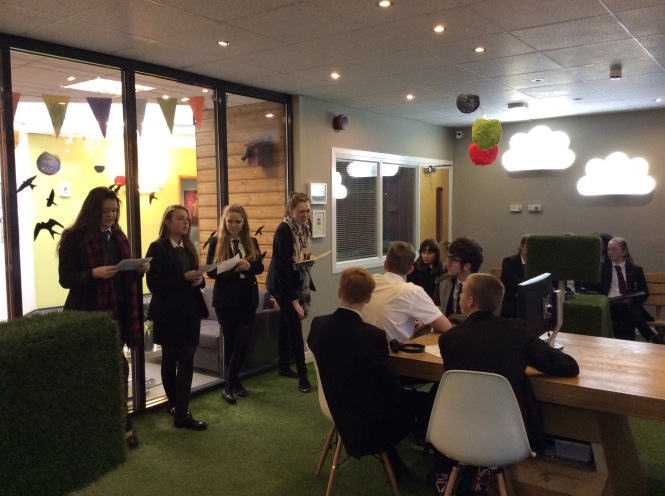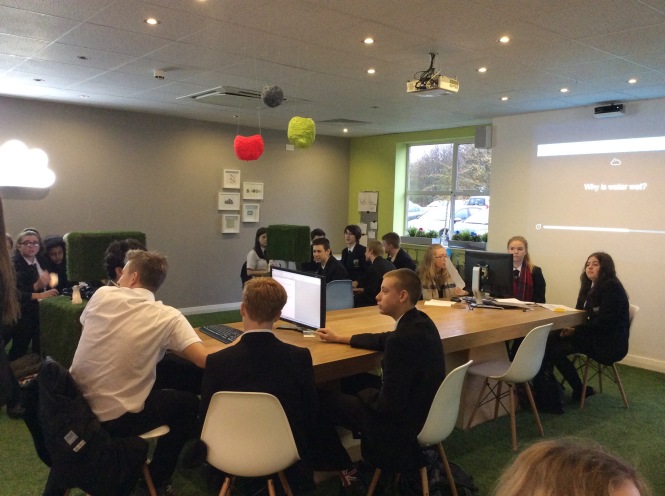Following the launch of SOLECentral on 10.11.14 both young people from Greenfield (The EngineHeads) and young people from George Stephenson (The Committee) both met together with Professor Mitra to talk all things SOLEs and teaching & learning.
What a lovely day of sharing and learning at ILab at Newcastle University. The young people were all amazing. They all got on so well and were so articulate about complex concepts about SOLEs and its impact on learning. Very, very proud.

Sugata started by suggesting some of the areas we might cover in the conference that day including:
Who uses our School in the Cloud labs at both schools the most/least.?
Who likes using it, why and who doesn’t and why?
We wanted to explore these questions about the teachers and students as we are all learners. We were interested to hear the things we had in common as TED SOLE labs in the UK and things that are different too. Sugata explained that all the things we are learning from this experience and sharing are important and will go around the world for others to think about too.
Sugata explained from his view that SOLEs can be a big change for some teachers to understand you don’t ‘teach’ inside a SOLE. He explained some of the problems he is facing with teachers, with understanding, with governments and with technology that can sometimes let us down. Some of these technology problems are happening frequently in the Indian labs.
The Engine Heads and The Committee were given 10 minutes to talk about some of the issues Sugata raised and to think about their own labs. Immediately they fixed up one of the computers and all gathered round it to collaborate, show each other stuff and talk.

Loads of interesting things came out of the discussions. I took notes throughout the day and wrote down direct quotes but may be paraphrasing some of the discussion as the debate was fast and furious and I may have missed something.
The group discussed who used the space and who liked it.
The students thought that year 7 and 8 like to use the lab more. One student thought that some teachers don’t seem comfortable enough yet to use SOLEs but some are a lot more used to it now.
“They are getting adapted to it more, being more free with their questions”
“Depends on the teacher as to the type of question you get in a SOLE, some who are comfortable ask really good questions others ask ones more about topics.”
Both schools explained that lots of students and teachers use the space including primary schools, holiday groups and other schools across the region as well as new friends who have visit from across the globe.
Sugata asked “How do you go about making a good question?”
“How would you ask a question about gum health for example. How would we do it?”
One student said that it helps when it is a question with many possibilities and answers to it. Another student suggested the question “How do animals keep their teeth clean? ”

Sugata explained that one way to explore gum health could be to ask the primary school group does anyone have a shaking tooth? Are you born with teeth? So then what happens? So if you grow teeth then what happens? If teeth then stop growing and they fall off why do they grow back? Well if they grow back do they last forever? If not forever and my grandma has none after decades why do they not grow back a second time? This will hopefully create a curiosity and the students will do a SOLE and might find out about milk teeth and why we have them and why our gums need to be strong and may get to gum health…? It’s good to try and think of the right type questions for the right types of ages to make them curious.
The young people explored questions a bit further and thought about the types of questions and subjects you can apply this.

Sugata asked “How good are SOLEs for maths?”
One student suggested that it is hard in maths to do a SOLE as often there is one fixed answer. He suggested that SOLEs works better when a range of answers are possible and you can collaborate to get the best description. Such as ‘how does money relate to happiness?’
Sugata explored this further with the group and suggested that SOLEs can be useful for helping to question the need for arithmetic for example.
This made one student say “Maybe you could explore the foundation of Maths and English not just the answers?”
Sugata – “Yes, you could approach it from different angle. Experiment with it, explore the story rather than just the ‘doing’. Rather than solving it, what if it’s more important to understand what an equation is and how it works for example?”
Student – “SOLEs can work well in lots of subjects like history for example. We did a question about who shot JFK and there were lots of answers as there’s not one definite answer and in geography you could do something about population for example”
Student ” I think SOLEs can be a lesson in itself and general questions are good rather than specific ones just to a subject. If you didn’t have subjects a SOLE crosss all subjects. It’s how you make the question that is important”
Sugata then talked about a GCSE question ‘what is an oxbow lake’.

Sugata asked “How long would it take you find out the answer on the Internet? 90 seconds? Why would that question be there now and why would it be important ? No guesses from you says it all….It was an important question in 19th century. You would sail out of country go up an unknown river and find an oxbow and know there’s no tides and know it’s safe place to park in unknown river. In 1810 you needed to know about Oxbows to park your boat- why is it there now? I’m trying to get this point of view across that it is left over from a different time.”
Sugata – “What would happen if you had the Internet in exams?”
One student suggested that people would just copy and paste and not necessarily learn.
Sugata wondered if you used the Internet in exams whether you would ask the same type of questions in exams…. What could you ask instead…?
One student suggested you could ask a question for more personal opinions. And then asked “But if you think people will just copy and paste then how can you learn in a SOLESs room if you are saying you will just copy and paste and not learn with the Internet?”
The student responded ” well in SOLE you use the Internet as a tool- it will help develop the understanding better”
Sugata added you can make the assumption that if they copy and paste they know the right things to copy and paste and there skills in working that out.
GCSE needs to change and include meta learning, judgment and personal opinion. How do you measure creativity and imagination too?
Student – “The way we learn should always adapt as the knowledge we need changes”
Sugata added that sometimes SOLEs can feel slow compared to ‘traditional’ teaching as its not someone at a board telling you what the answer is which can seem quicker. SOLEs can feel slow.
The group continued to explore other areas of SOLEs including the role of the granny. We were also very lucky to be able to hear from Cathy Ellis in her role and also Anne Preston and the digital kitchen.

Thank you to everyone for sharing their thoughts and experiences. It was so useful to hear, with honesty, how the young people who are helping lead this learning feel about SOLEs and the difference it can make. Was a pleasure to work together.

















